by: Mneesha Gellman, Emerson College (visit author’s website)
Cliquea aquí para el artículo en espanol
I have a confession to make. I have been avoiding writing this post for a long time, because secretly, I worry that what I have to say about digital fieldwork will be discouraging, unhelpful, or come off as snobbish. But as a political ethnographer committed to transparency and reflective openness, I know we have to talk about positionality and process, even when it is messy or hard. So here goes.
Scholars derive intellectual fulfillment from an enormously wide range of endeavors. For those who may not have the resources to get to the field, the family flexibility to spend time there, or the personality to enjoy extensive human interaction, the pandemic-catalyzed innovations and acceptance of digital fieldwork may feel like a relieving step forward. For me, in-person fieldwork has been the most fulfilling work I have done as a scholar. The pandemic pause was something I have waited out impatiently. I love talking to people and being in the spaces of others as a way to reflect on and analyze the world. Despite insufficient training in ethnographic methods in graduate school, fourteen years ago I flung myself into the field for doctoral research and never looked back.
Like any modality, there are highs and lows with in-person fieldwork. My projects tend to require living extensively in research sites, frequently dragging my family along and enrolling my children in nearby schools for a semester at a time. These transitions were easier when the kids were babies and a boob and some attention would soothe them. It is harder now that they are older and have their own social worlds and strong opinions about where they want to live. At the same time, the intercultural experiences they have while living with me in field sites are meaningful parts of their own development. Tradeoffs abound.
Those trade-offs have been fruitful my books and articles. In-person fieldwork has allowed me to do more than 400 qualitative interviews, twenty-plus focus groups, and spend hundreds of hours formally observing case study spaces (from protests to high school classes) as well as hundreds more hours in informal meetings and hanging around in communities of interest, from Indigenous Oaxaca and Chiapan towns to Salvadoran and Turkish cities, or my own hometown in far Northern California. Being in situ researching is what I love. I have learned over the years how to do political ethnographic work in a wide range of political circumstances and material conditions. I’ve honed everything from community-based permissions as a step beyond IRB to ensure ethical research, to learning how to best organize my notes and contact logs to facilitate later writing.
This deep connection to being in-person for research made the requisite pivot to digital fieldwork during the Covid pandemic really hard—painful, even—and perhaps that is why I’ve avoided this particular writing invitation for so long. Writing about the pivot means revisiting the sorrow I held when, at the end of March 2020, halfway through a U.S. Scholar Fulbright in Oaxaca, Mexico, I was told that I had to pack up and leave the country immediately, at risk of losing Fulbright alumni status if I didn’t comply.
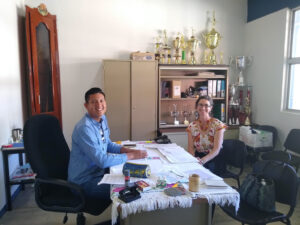
Meeting with Paul Romario Santiago, Director of a high school in Guelatao, Oaxaca, Mexico, where Indigenous languages are part of the curriculum.
My kids were enrolled in a local school and had finally settled into Spanish and were making friends. My husband had found his rhythm working remotely. We were at equilibrium. I had completed much, but not all, of the data collection for my second book, Indigenous Language Politics in the Schoolroom: Cultural Survival in Mexico and the United States. The book focuses on how access to Indigenous-heritage languages informs youth identity, and fosters political, cultural, and civic awareness and sometimes participation for high school-aged students. I had planned to spend the second half of the Fulbright working with the schools where I had carried out data collection. The idea was to help design interventions to address some of the issues the research revealed—namely a culture of discrimination for students who deviated from social norms, including along gender lines or towards those deemed “too Indigenous.” I intended to give back to the schools, not just take information about them and disappear.
We left Mexico when all the schools closed or went virtual. My physical presence didn’t matter anymore if both my own kids, plus the high schoolers I was studying were now convening online, or through mailed packets of homework. Such packet schooling quickly became the norm in many Oaxacan schools, where families did not have sufficient internet nor data to support either synchronous or asynchronous learning. My family decamped for Covid exile to far Northern California (we had rented out our home in Boston based on the Fulbright fellowship timeline, so we became nomads while waiting to be able to go home). In the midst of that move, I tried to figure out how to do right by the schools I had spent so much time gaining access to and bring some sense of closure to the project.
What worked: Finishing out communications started in person
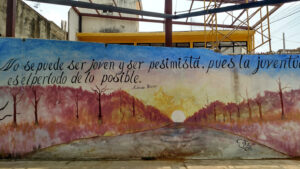
Mural translation: “It is impossible to be young and be pessimistic, because youth is the time of possibility.”
By the time I left Oaxaca and the pandemic was underway, I had already spent considerable hours loitering in the hallways and classrooms of three high schools, and had signed permission forms from some student participants who knew who I was and the gist of the study. I had already completed interviews and focus groups with the “easier to access” students—those who attended the high school down the street from my house in Oaxaca City, and those who went to a high school in Teotitlán del Valle, about forty-five minutes east. The interviews I had left were with students in some of the most precarious circumstances. They attended high school deep in the mountains of the Sierra Norte region in Oaxaca—Bachillerato Integral Comunitario No. 1 (BIC 1) in Guelatao—but some students were from villages even more remote than the school. Other students were boarders in the town because they came from civil war-torn communities in other parts of Oaxaca. These young people, ages 14-18, had to leave Guelatao and go home when the pandemic started because the school closed for in-person instruction. It didn’t make sense for them to stay and pay rent in town. BIC 1 students had the least access to technology of any of the students I interviewed, which influenced my experience trying to follow up with them in April-May 2020.
On my last visit to the school in person, I had been able to get the phone numbers of the remaining students I wanted to talk with. Had I not built the relationships prior in person, it is possible, with the right pitch to a sympathetic fixer, that I could have been introduced to people virtually and that some people might have agreed to participate in a digital-only modality. Of course, the quality of interaction wouldn’t be the same. The in-person accountability—essentially the visual and verbal stamps of approval for talking to me given by the school director and language teacher—were a social currency that my digital fieldwork benefited from. But it isn’t impossible that a persistent digital researcher couldn’t also make contact and carry out research, skipping the primary in-person step. Such an approach is a different mode of relationality, which influences everything from who is willing to speak or interact digitally, to what they might share. As long as the limits of digital fieldwork are openly discussed, it can be a viable path for researchers who need or prefer it.
When I reached out to students following our mutual exodus, it was via WhatsApp, the ubiquitous Facebook-operated technology that is widely used in Latin America as a free internet-based calling and texting tool. I carried out six final interviews digitally, using combinations of technology: voice calls, video calls, and text exchange. The type of WhatsApp exchange was dictated by the availability of the internet and students’ phone data plans. For two students who lived in villages with wifi coverage, we were able to carry out video calls on our phones. Two other students didn’t have the bandwidth to support video calls, so we did voice-only calls. The remaining students had neither good internet nor data credit, so our exchange was through a series of texts. I was able to copy the text exchange and save it the way I usually save transcriptions of audio interviews, allowing me to go back and analyze their statements later.
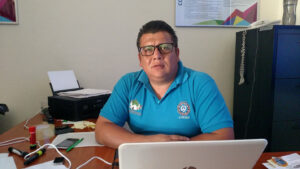
Meeting with Francisco Vicente Martinez Covarubias, Director of a high school in Teotitlán del Valle, Oaxaca, Mexico, where Zapotec language is in the curriculum.
On the one hand, digital fieldwork in this context was highly useful, and generally invoked similar interview themes as had come up in in-person interviews. Because the students I engaged with digitally already had context for me, and they had limitations on data, these conversations were shorter in duration than the in-person interviews, lasting 30-40 minutes as opposed to 50-80 minutes. This forced me to cut the fluff and get to the point. In this way, the pivot to digital data collection perhaps made me more efficient as a researcher. But such efficiency came at the expense of relationship-building, which is a part of the work that I love, especially when working with young people in precarious situations.
One unanticipated benefit of digital fieldwork in this context was that it allowed me to ask about how the transition home was for students, as well as their families’ experience of the pandemic. The additional, unexpected layer of information about students returning to conflict regions in the Mixteca ended up seeming so important that I wrote a separate article about it. On the other hand, hearing about the trauma of students returning to communities where family members have been assassinated, or where they didn’t have enough food to eat, was much harder to deal with in the digital context. I was far away and didn’t know how to help from a distance.
Hearing traumatic information in person, I have always at least offered to try to connect them with services available through the school or community. With so many layers of distance between us, hearing the trauma with no comfort to offer besides words felt riskier for them, and therefore less acceptable as a research practice. An ethics of care in research—a commitment to tend relationships that emerge in the pursuit of knowledge with caring intentionality, and a commitment to do no harm—includes taking precautions against re-traumatization or exacerbating participant stress or anxiety. This proved impossible for me in this particular digital fieldwork context. I didn’t have contacts in the numerous different communities interviewees were based in, nor did I know what was available to them in the context of the pandemic. One of them, who had the most extreme situation of food insecurity, gave me permission to communicate their distress to the school director, in hopes that the director may have a way to help. I did so, but I was unable to verify if the student ever received assistance. It is one of the digital stories that haunts me.
Benefits and limitations of digital fieldwork
I understand the need to support digital fieldwork as a viable path for research in moments of access constraint—whether a pandemic or political crisis—especially for graduate students and other scholars who have time-sensitive data collection needs in order to meet critical professional benchmarks. I also recognize the potency of digital fieldwork to expand access to data in more inclusive ways, especially for Global South-based scholars and others who may not have the resources to travel or live “in the field” for extended periods of time. This is part of an equity approach to making the disciplinary pipeline more representative of the world we live in.
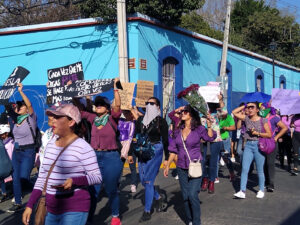
International Women’s Day march in Oaxaca, Mexico, March 8th 2020.
At the same time, I am very wary of encouraging digital fieldwork as an alternative to in-person fieldwork when the latter is viable, because I believe that the relationship-building that happens with in-person encounters is a valuable part of the research process for many (although not necessarily all) types of research. I acknowledge that this preference may be particular to me, as we all relate differently to the role of technological media, as well as in-person social interaction in our intellectual lives.
It is also likely, depending on the circumstances, that digital fieldwork can be a useful tool to extend data collection after in-person fieldwork. Subsequent follow-up engagement after relationships have been built in person can potentially deepen connections. Indeed, I carry out relationship-maintaining check-ins with a number of colleagues digitally that help keep momentum going in the research. However, the success of creating such relationships entirely from digital interactions may be shaped by the contours of specific research puzzles, technological access, as well as the social standing of whomever researchers contact as the initial point of introduction to others.
Tensions between inclusivity and neocoloniality
A colleague recently illustrated to me the danger of turning away from in-person work. He, from a Caribbean country, attended a conference in Europe dedicated to the study of that country, where most of the other scholars were White Europeans. During a presentation, one of the few other Black scholars in the room asked to see a show of hands of how many people had actually visited the country of study. Almost no one raised their hand.
The neocolonial expertise circulating in the room—where White scholars are experts on aspects of Black culture without even setting foot in the country of interest—might be an extreme example, but it is also deeply concerning. How can we engage the inclusive, decolonizing aspects of digital fieldwork, while keeping in mind the risks of furthering scholarship of place that is not rooted in place? Clearly such risks are not built into every research design. But the risks do exist. It is a testament to the caring community of scholars running the Digital Fieldwork website that they want to create a space to examine these hard questions, rather than occlude them with a wild leap towards all-Zoom-everything.
And to be fair, I have had my own successes with digital fieldwork. Not only were those six digital interviews in 2020 important, but the collaboratively designed research puzzle for my newest in-process book project was developed in a series of Zoom meetings with colleagues at the Yurok Language Program. They were in far Northern California, and I was in Boston and Mexico. Zoom let us meet and discuss ideas until we reached consensus on a plan. Digital fieldwork in that situation was very helpful. But in that case, not only did I have preexisting relationships with those colleagues that allowed us a degree of trust and fluidity working in digital space that, we were also equal collaborators, so the power dynamics were very different. Trying to build trust as an outsider with participants digitally and from scratch would have been much harder.
However, there are plenty of situations in which such trust could be built digitally. Researchers who are also insiders within communities of interest, but located elsewhere during their research—graduate students based at universities but designing dissertation research to be implemented in their communities of origin elsewhere, for example—may be well-positioned to engage in digital fieldwork. Scholars who have solid contacts with respected community members who are willing to serve as connectors may also be able to launch digital fieldwork without time on the ground. I caution that whether initial contacts are made digitally or in person, the reputation or social perception of the contact who introduces a researcher to others—a connector or fixer who assists in helping identify potential study participants—may be deterministic in whether purely digital fieldwork is viable.
There are also situations where purely digital fieldwork may never be ethical. Even if, for example, I was able to make contact with Oaxacan students at a BIC high school via their teacher or school administrator and they were willing to engage digitally, doing so without first seeking permission from local Indigenous authorities would be a breach of protocol. It would not be appropriate to seek that permission digitally even if it were logistically possible (which in many communities it is not), because showing up in person is inherent to the trust-building process. It is part of an ethics of care in research.
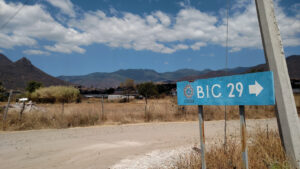
Sign pointing toward a research site, a public high school in a small town in Oaxaca, Mexico.
Another consideration is that when communities have been wronged by outsider researchers in the past, digital fieldwork may feel too vulnerable for potential respondents. Communities that have been misrepresented by researchers in the past, or where there are big risks for participants in speaking up—in conflict zones for example—may not be appropriate choices for digital fieldwork. Colonization and other forms of exploitation increase the vulnerability of some communities. Historically and contemporarily marginalized communities, for example, may not be good sites for only digital fieldwork, even if it might be logistically possible, because the interpersonal trust and accountability does more than just provide research access. Such relationships are also part of undoing past patterns of harm by demonstrating an ethic of care towards participants.
Conclusion: Looking for an ethics of care for digital fieldwork
There is rich space for growth in the theorization of what an ethics of care entails for digital fieldwork. I am supportive of digital fieldwork in a range of circumstances, like when it extends or builds on preexisting relationships, or is undertaken by insiders who are located elsewhere at the time of research. More broadly, I see the merit in digital fieldwork when it can be carried out within an ethic of care for participants. I am skeptical, although not denying the possibility of digital fieldwork success, when relying exclusively on it for community contact. And I am concerned about implementing digital fieldwork when an ethic of care towards marginalized communities might be in jeopardy, or when relationships may be one-sided and extractive within communities that have already experiences previous harm from researchers and outsiders. Context is key, and there are many variables that factor into what can succeed or fail in both digital and in-person work.
My advice for potential digital scholars is to check the justifications for each step of the decision-making process and evaluate it through the lens of an ethics of care. I ask myself a lot of questions within my own research process that can be shared by many types of researchers. Who is the fieldwork serving? How does this research respond to the needs and interests of the community? Am I taking care to avoid harming participants? Am I actively trying to protect them in our interactions? Is there sufficient triangulation—checking the accuracy or validity of claims across multiple methods, stakeholders, or other forms of knowledge assessment to make sure I am doing deep research? Am I reaching saturation with my methods? Do I have a process for member-checking—taking findings back to research participants to check the accuracy of analyses based on data they helped provide—built into the research design? Questions like such as these can help avoid the biggest pitfalls in research writ large, and help midwife meaningful investigations that benefit multiple stakeholders.
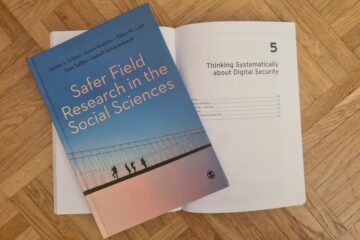
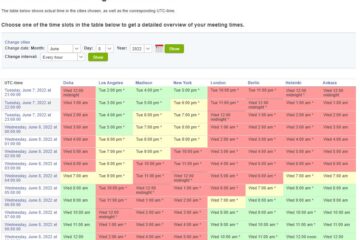
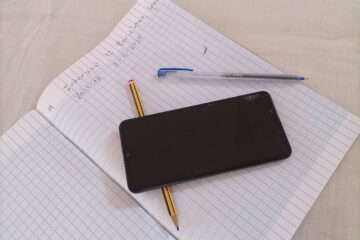
1 Comment
Definición de una ética del cuidado en el trabajo de campo: Reflexiones sobre el giro digital - Digital Fieldwork · February 6, 2023 at 1:28 pm
[…] here to read this article in […]
Comments are closed.